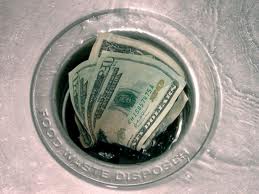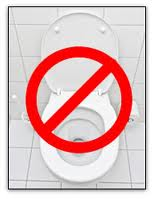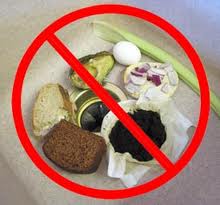Welcome to San Diego Blog | May 4, 2011
What NOT to Flush or Put down Your Garbage Disposal

We live in a high-rise condominium in downtown San Diego. We recently returned home to find that a clogged pipe had caused water to back-up and actually come up our drain and onto our hardwood floor. This required plumbers to clear the clog; a flood restoration team to clean up the unsanitary water, cut into our walls and use dehumidifiers and industrial fans to attempt to dry out our walls and wood floors; a flooring company to rip out our wood floors, replace all of the sound (kinetics) underlayment, and install new wood floors (because the wood warped from the water and fans and dehumidifiers could not dry out the existing underlayment); and a contractor to repair the drywall, texture and paint our walls. As you can imagine, it was quite a mess and very expensive!

• disposable diapers
• feminine products (tampons and applicators, mini or maxi pads)
• dental floss
• cotton balls and swabs
• unused medications (return to local pharmacy for disposal)
• condoms
• cleaning wipes of any kind (including the toilet bowl wand brush that says they are flushable)
• facial tissue (Kleenex)
• bandages and bandage wrappings
• disposable napkins, Handy Wipes, baby wipes, hygiene wipes, etc. (even if they say that they are flushable)
• Razors and blades
• Syringes and needles
Some of these items are listed because they are known to cause clogs and plumbing problems, others are on the list because they are harmful to our water supply.

• Rice and Pasta (bloat with water and clog)
• Animal bones (cannot be fully ground up by disposal)
• Grease (it will eventually solidify, line the inside of your pipes, and clog)
• Egg shells (they do not sharpen your disposal’s blades, just cause clogs)
• Any kind of stringy or tough-peeled vegetable (including asparagus, lettuce, celery and potato peels)
• Peels or skins of any kind (including banana peel, potato skin, avocado skin, etc.)
• Fruit pits
The old adage of “less is more” definitely applies to the garbage disposal. Only small amounts of table scraps should go into the disposal – the best idea is to scrape all remaining table scraps into the trash can before rinsing the plate.
Protect yourself and your neighbors (remember, in condominiums your clog can quickly become your neighbors’ problem as well – or their clog can become your’s) avoid a costly clog by being careful what you flush and what you put down the kitchen sink (and share this information with your neighbors)!